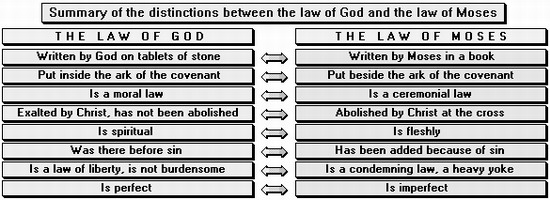Ephesians 2:15 - Are the Ordinances the Ten Commandments?
Satan is so desperate to keep Christians from loving obedience and quality time with our Lord and Saviour on His holy day, that some have gone as far as to say that the Ten Commandments and the Ordinances are the same thing. To put this simply another way that reveals the heresy. This would be the same as saying that taking an animal to the temple priest for a sacrifice for sin is the same as one of the Ten Commandments or a moral law if you prefer. Clearly this is not so.
Ephesians 2:15 is one such abused verse that reads, “Having abolished in his flesh the enmity, even the law of commandments contained in ordinances; for to make in himself of twain one new man, so making peace.”
 The Greek word for ordinances in this verse is the same word used in Colossians 2:14 that refers to what was nailed to the cross. Paul reveals in Colossians 2:16 that these ordinances had “meat and drink offerings,” “holy feast days,” “monthly new moon festivals” and “yearly sacrificial Sabbaths” that Ezekiel 45:17 ever so plainly reveals that this is what was practiced to make reconciliation for sin. In other words, the sacrificial law, which was part of the Mosaic Law. The Ten Commandments were written in the Ten Commandments while the Mosaic Law was written in the Mosaic Law.
The Greek word for ordinances in this verse is the same word used in Colossians 2:14 that refers to what was nailed to the cross. Paul reveals in Colossians 2:16 that these ordinances had “meat and drink offerings,” “holy feast days,” “monthly new moon festivals” and “yearly sacrificial Sabbaths” that Ezekiel 45:17 ever so plainly reveals that this is what was practiced to make reconciliation for sin. In other words, the sacrificial law, which was part of the Mosaic Law. The Ten Commandments were written in the Ten Commandments while the Mosaic Law was written in the Mosaic Law.
Here is what the Strong's and Thayer dictionaries state on the Greek word dogma for ordinances used in this verse. As you can see, there is not so much as a hint of the Ten Commandments being mentioned. Strong's effectively labelled it the ceremonial law while the Thayer dictionary was even clearer stating it was the rules and requirements of the law of Moses. The ordinances are also called the Law of Moses and you can see some of the key differences between laws on the image here or you can read the Ten Commandments and the ceremonial law for detailed information.
And here is another example for even more clarity. Before the cross in the Old Covenant there were both the Ten Commandments and the Ordinances as also seen from Luke 1:6 that alone proves they are not the same thing. Hebrews 9:1-2 below states that the Old (first) Covenant also had ordinances and hence is clarifying that the New Covenant does not. And if the Old Covenant “had also” which means in addition to something. Then what is left? See Luke 1:6 again for the obvious answer. So to ask an obvious question. Do these two verses refer to the moral law or the sacrificial law? Note that the “worldly sanctuary” in verse 1 and “the candlestick, and the table, and the showbread; which is called the sanctuary” in verse 2 unmistakably belong to the temple or sanctuary which is where the animal sacrifices were carried out and hence the sacrificial law and not the moral law.
Hebrews 9:1-2 “Then verily the first covenant had also ordinances of divine service, and a worldly sanctuary. 2 For there was a tabernacle made; the first, wherein was the candlestick, and the table, and the showbread; which is called the sanctuary.”
And a little bit further into the chapter the author makes reference to the ordinances again and the meat and drink offerings Paul speaks of in Colossians 2:14. Note in verse 12 it says, “Neither by the blood of goats and calves, but by his own blood he entered in once into the holy place.” I am sure it requires no explanation that this is not referring to the Ten Commandments but to blood sacrifices for sin which are the ordinances as stated in verse 1 and 10.
Hebrews 9:10-12 “Which stood only in meats and drinks, and divers washings, and carnal ordinances, imposed on them until the time of reformation. 11 But Christ being come an high priest of good things to come, by a greater and more perfect tabernacle, not made with hands, that is to say, not of this building; 12 Neither by the blood of goats and calves, but by his own blood he entered in once into the holy place, having obtained eternal redemption for us.”
And what was the enmity that was abolished in the flesh of Christ that Paul spoke of in Ephesians 2:15? Albert Barnes' notes on the Bible explain this well while having this expert theologian validate that these ordinances do in fact belong to the Mosaic Law which was written in a book, and not in stone as were the Ten Commandments of God. You will also note that this theologian states that these ordinances are not the moral law.
There is now a growing group of Churches that came from the collapse of the Herbert Armstrong movement that insists that we still need to observe the feast days without the sacrifices that were in the Mosaic Law that ended but scripture shows this movement is in error. See do we need to keep the feast days for seven reasons that inform us that these feast days ended with Christ forever.
Read Colossians 2:16 or were the Ten Commandments nailed to the cross for more information on these ordinances that involved sacrifices for sin before the cross.